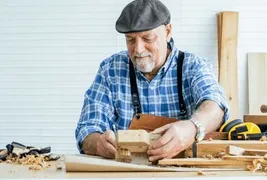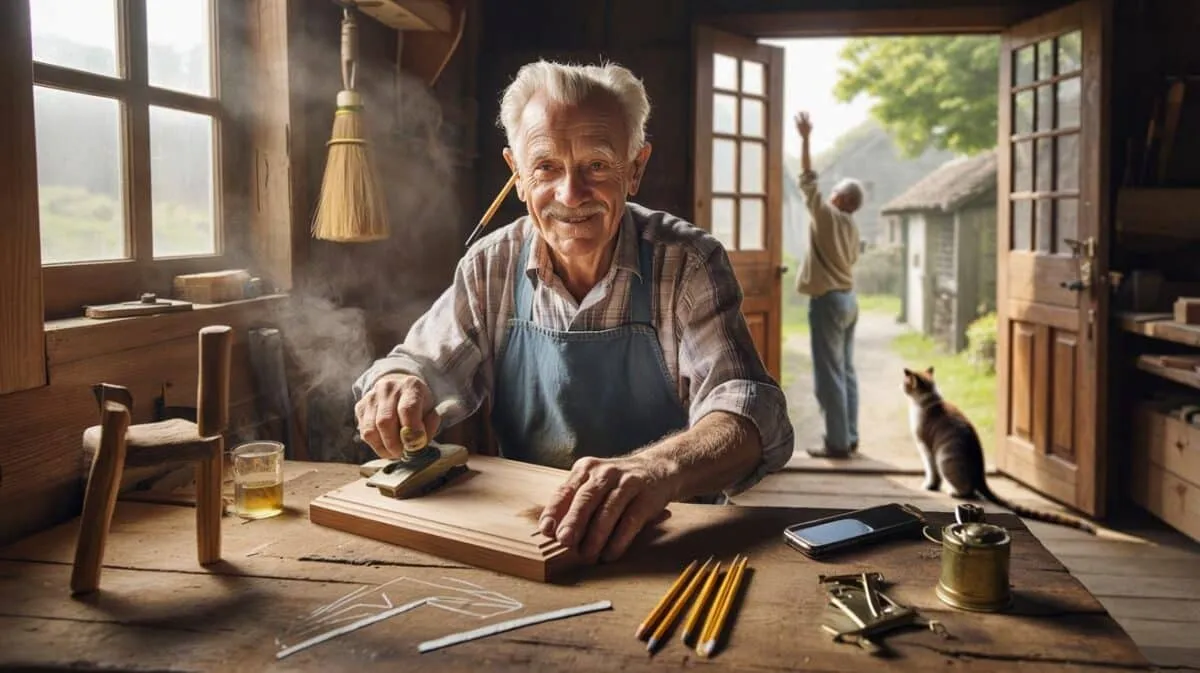The Silent Carpenter: How One Man Secretly Restored an Italian Town’s Heart
In the heart of Italy, where cobblestone streets wind through centuries-old piazzas and the evenings smell faintly of espresso and warm bread, there exists a small town that recently discovered a secret guardian—one who never sought applause, gratitude, or recognition. For five years, this retired carpenter moved silently through the moonlit streets, carrying a bag of tools and a lifetime of craftsmanship in his hands. His mission was simple yet profound: to repair the town’s broken, forgotten public benches.
In the heart of Italy, where cobblestone streets wind through centuries-old piazzas and the evenings smell faintly of espresso and warm bread, there exists a small town that recently discovered a secret guardian—one who never sought applause, gratitude, or recognition. For five years, this retired carpenter moved silently through the moonlit streets, carrying a bag of tools and a lifetime of craftsmanship in his hands. His mission was simple yet profound: to repair the town’s broken, forgotten public benches.
What began as a humble personal gesture grew into something far more meaningful. By the time the townspeople noticed, it wasn’t just the benches that had been restored—it was the community itself.
This is the story of how one man’s quiet dedication transformed an entire town, reminding us that acts of kindness don’t need a spotlight to make a lasting impact.
Table of contents
- A Town Full of Benches—and Stories
- The Carpenter Who Couldn’t Ignore What Others Accept
- Why He Chose the Night
- The Slow Realization: “Someone Is Taking Care of Us”
- The Moment of Discovery
- A Community Inspired
- The Power of the Unseen Good
- Why It Mattered More Than Anyone Realized
- A Legacy of Quiet Kindness
- What This Story Teaches Us
- The Benches Continue to Stand
- Want More Inspiring Words?
A Town Full of Benches—and Stories
In many Italian towns, benches are more than just places to sit. They are social stages: grandparents gossiping in dialects as old as the hills, children eating gelato during summer evenings, teenagers sharing secrets under the stars, tourists resting tired feet after exploring ancient cathedrals, and old friends reconnecting after decades apart.
In this particular town—small enough for everyone to know one another’s grandparents, but big enough for life to stay comfortably anonymous—benches were woven into the rhythm of daily life.
But as time went by, things changed. Funding for small repairs dried up. The local maintenance crew shrank. Wooden planks splintered, screws loosened, paint faded, and metal legs rusted. One by one, the benches became unusable.
Yet most people didn’t complain. They simply adapted—sat elsewhere, leaned against walls, or kept on walking. Little by little, a quiet decline settled over the town, accepted but never addressed.
Except by one man.
The Carpenter Who Couldn’t Ignore What Others Accept
His name is known now, but for five long years it wasn’t. The townspeople simply woke up to find yet another bench mysteriously restored.
Sometimes a new plank gleamed in the morning sun, sanded and varnished so perfectly it looked like it belonged in a craftsman’s showcase. Other times paint had been renewed, screws tightened, legs reinforced, or wobbly seats steadied.
People wondered who was doing it, but no one ever saw anything. The repairs appeared overnight, as if the town had a guardian angel with a hammer.
In truth, he was no angel—just a retired carpenter with calloused hands, a stubborn sense of responsibility, and a deep love for the simple beauty of public life.
He had spent over forty years crafting furniture, repairing farmhouses, restoring church doors, and building kitchens that lasted generations. When retirement arrived, he tried to relax. But rest never came naturally to him.
And so, walking home from an evening stroll one day, he noticed a broken bench in the piazza. He saw a young couple trying to sit, only to stand up again when a wooden slat snapped. That sight lingered in him.
He returned the next night with tools.
One repair turned into two. Two became ten. Ten became a town-wide mission.
Why He Chose the Night
There was something poetic about the way he operated—quietly, humbly, without a desire for recognition.
The carpenter chose the night not because he wanted to be mysterious, but because he didn’t want to bother anyone. He feared that people might misunderstand his intentions, or that the municipality might discourage his involvement due to rules and bureaucracy.
But above all, he didn’t want thanks. He believed that kindness should flow freely, without expectation.
The stillness of the night became his companion. Under soft streetlights, he worked methodically.
Sand. Measure. Cut. Tighten. Paint.
He moved from bench to bench, often finishing just before dawn, returning home before anyone could notice.
Over time, he became attuned to the needs of each corner of town. The bench by the bakery always wore out faster. The one near the old fountain needed fresh varnish every year. The one under the fig tree required more frequent tightening due to moisture.
Night after night, year after year, he quietly preserved the pulse of the town.
The Slow Realization: “Someone Is Taking Care of Us”
No one expected this level of dedication, and certainly no one expected it to continue for five years. At first, people dismissed the repairs as the work of a municipal worker or volunteer group. But patterns emerged:
- The repairs were too detailed.
- Too lovingly done.
- Too specific to each bench’s unique quirks.
These weren’t generic fixes—they were handcrafted restorations.
The mystery deepened, and the townspeople grew curious. Some joked that perhaps it was a ghostly carpenter from centuries past. Others wondered if someone was trying to leave a message.
But something beautiful happened: the benches regained their purpose.
Grandparents returned to their favorite spots in the piazza. Schoolchildren flocked to the shady benches after classes. Elderly men resumed their card games in the afternoons. Tourists sat comfortably during summer evenings, unaware that the bench beneath them was a gift of anonymous kindness.
A subtle rejuvenation flowed through the town, and people felt it. There was a sense that someone cared—someone wanted the town to stay alive, vibrant, and warm.
The Moment of Discovery
The carpenter’s anonymity lasted remarkably long. But like all mysteries, it eventually unraveled.
One early morning, just before sunrise, a local baker finishing an overnight shift noticed a figure by the church square. He saw the familiar outline of a tool bag and heard the soft rhythm of sanding.
The next day, the baker quietly told a friend. That friend told another. Within a week, the entire town had figured out who the nighttime caretaker was.
The carpenter was embarrassed when people approached him, grateful but flustered. He hadn’t intended to be discovered. All he ever wanted was to keep the town beautiful and functional.
But instead of overwhelming him, the townspeople respected his humility. Many simply left small notes of thanks on the newly mended benches:
“Thank you for caring about our community.”
“You made this town feel young again.”
“This bench is where I first talked to the woman who became my wife—thank you for saving it.”
For a man who never sought gratitude, these notes were both surprising and touching.
A Community Inspired
His story spread beyond the town’s boundaries—first through word of mouth, then through regional newspapers, and eventually across social media. People were moved not because the act was grand, but because it was intimate and deeply human.

The carpenter’s dedication sparked a wave of inspiration:
- A group of teenagers started repainting the children’s playground.
- Parents organized monthly cleanup drives.
- Local artists volunteered to design murals on old walls.
- Residents began planting flowers near walkways and public spaces.
What began as a one-man mission blossomed into a community-wide revival.
The carpenter, now aware of his influence, continued his nighttime work—still preferring the quiet hours, still unconcerned with praise.
But now he walked through a town that glowed with renewed energy, in part because of him.
The Power of the Unseen Good
There’s something profoundly moving about a good deed performed without an audience.
We live in a world where recognition often follows action—where good intentions are broadcast online, where kindness becomes content, where helping others is sometimes framed for social media.
But the carpenter reminds us that the quietest acts can be the most meaningful.
He asked for nothing. He expected nothing. He wanted nothing but to make life a little easier for others.
His work was a love letter to his town, written in wood, nails, and varnish.
Why It Mattered More Than Anyone Realized
While the story seems simple on the surface—an elderly man repairing benches—it carries deeper resonance.
1. It restored a sense of place and belonging.
People returned to the benches not just to sit, but to reconnect, reflect, talk, love, and rest.
2. It strengthened community pride.
Seeing their town cared for inspired others to cherish it too.
3. It preserved tradition.
In Italy, public spaces are an extension of home. Benches in particular symbolize connection and presence.
4. It revived civic spirit.
Residents began to feel responsible for their shared environment, nurturing it together.
5. It showed that small actions accumulate.
A few screws, some paint, a couple of hours—each repair may have seemed tiny. But multiplied over time, the impact was monumental.
A Legacy of Quiet Kindness
Today, the carpenter is still active, though he accepts help more easily. Young volunteers sometimes join him in the early morning, though he insists on doing most of the delicate work himself.
The town has officially recognized his contributions—not with a loud ceremony, but with a simple wooden plaque on one of his first benches. It reads:
“To the one who mended what others forgot—thank you.”
He blushed when he first saw it. But in his heart, he felt something he rarely acknowledged: pride.
Not pride in being recognized, but in seeing how the town had blossomed—not because he sought credit, but because he cared.
What This Story Teaches Us
Stories like this remind us of the quiet heroes who live hidden among us—people who choose kindness without needing validation.

The carpenter didn’t change the world. But he changed his world. And sometimes, that’s exactly enough.
His story teaches us that:
- Kindness does not need witnesses.
- Community grows from small acts.
- No gesture is too small when done with love.
- Even unnoticed efforts can shape a town, a culture, a future.
- Real generosity is quiet, patient, and persistent.
Most importantly, it reminds us that every community is sustained not by grand gestures, but by ordinary people choosing to give a little of themselves.
The Benches Continue to Stand
Walk through that little Italian town today and you’ll find benches that look almost new, each one lovingly tended. Some are rustic, others freshly painted, all of them sturdy enough to hold conversations, memories, and shared moments.
But if you look closely—really closely—you’ll notice something subtle. A certain craftsmanship. A tenderness in the woodwork. A familiar pattern to the repairs.
A signature, without a signature.
A reminder that somewhere, in the quiet hours, a retired carpenter once chose to make something better—simply because he could.
And in that choice, he restored more than benches. He restored hope, connection, and the belief that goodness still thrives in the most ordinary corners of the world.
Positivity That Inspires Real Change
Quiet acts of kindness, compassion, and emotional awareness often transform communities in ways that words cannot capture. These thoughtful reads explore how perspective, presence, and inner strength can influence the world around us — just as one man’s quiet work restored a town’s spirit:
- Embody the Energy You Want to Attract – Cultivate Positivity, Kindness & Gratitude — Discover how small, heartfelt actions can create ripple effects that uplift others and inspire collective healing.
- The Art of Mindful Noticing – Training Your Awareness Muscle — Learn how slowing down and paying attention can deepen your connection to people and places — and reveal beauty in the everyday.
- Embracing the Journey: Finding Clarity and Growth in Feeling Lost — Explore how moments of uncertainty often guide us toward purpose, resilience, and a more meaningful path.
Want More Inspiring Words?
Explore Kindness Quotes — Heartwarming reminders of how small gestures can make a big difference in someone’s world.
The Positivity Collective
The Positivity Collective is a dedicated group of curators and seekers committed to the art of evidence-based optimism. We believe that perspective is a skill, and our mission is to filter through the noise to bring you the most empowering wisdom for a vibrant life. While we are not clinical professionals, we are lifelong students of human growth, devoted to building this sanctuary for the world.
